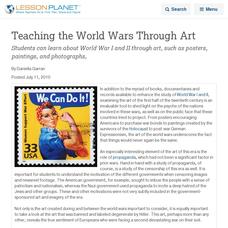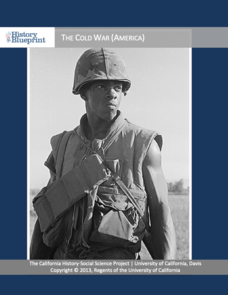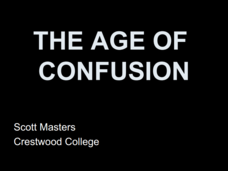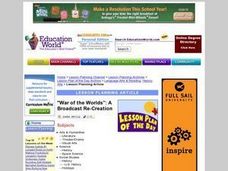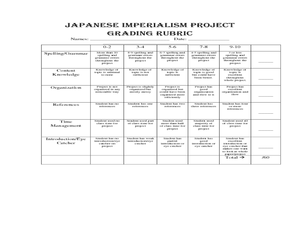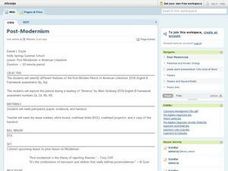National Endowment for the Humanities
Chronicling America: Uncovering a World at War
As part of a study of World War I, class members read newspaper articles from the time that urge American involvement, non-involvement, or neutrality. Using the provided worksheet, groups analyze the articles noting the central argument...
Worksheet Web
Analyzing the Text
Practice analyzing informational text with a reading passage that details the Great Depression. Scholars read about the impacts of World War I, the Roaring Twenties, and the Depression, then answer 10 true or false questions.
Curated OER
The 1920s and World War I
In this global studies worksheet, students read the noted pages in their textbooks and then respond to 8 short answer questions and write a thematic essay about the 1920's and World War I.
Curated OER
Teaching the World Wars Through Art
Students can learn about World War I and II through art, such as posters, paintings, and photographs,
Indiana University
Literature of Asia and the Middle East: "A Sound of Hammering" by Dazai Osamu
Dazai Osamu’s short story, “A Sound of Hammering” is the focus of a three-day investigation of modern Japanese literature and life in post-World War II Japan. The events in Osamu’s story mirror those in his own life, and give a...
University of California
The Cold War (America)
The Cold War—with its roots in World War II—impacts the world today. Using an extensive curriculum, scholars consider its impact through primary sources, including speeches and propaganda, as well as other skills-enhancing activities. An...
Maryland Department of Education
The Concept of Identity Lesson 8: Propaganda in Visual Media
Visual and print propaganda are featured in a lesson that asks readers of A Separate Peace to examine the techniques used in propaganda from World War I, World War II, presidential elections, and in the novel.
Curated OER
The Age of Confusion
According to the presentation, the age of confusion was marked by a very specific set of art and philosophical movements. Take a visual trip, and explore expressionism, cubism, Dada, Bauhaus, existentialism, and the new modes of...
Curated OER
The Blues: The Father of Rock And Roll
Students examine influence The Blues had on Rock and Roll and the concomitant social, political, and economic factors and movements during the post-World War II period. Students then research and create multimedia reports on...
Curated OER
"War of the Worlds": A Broadcast Re-Creation
Why did Orson Welles' 1938 Broadcast of a adaptation of H.G. Wells' The War of the Worlds cause such a panic? To answer this question, class members listen to the original broadcast and research the panic that resulted. They then engage...
Curated OER
Back to the Past
What was the Untied States like in 1938? What were the concerns of Americans in the post World War I era? What were their fears? What were their sources of news and entertainment? To understand the reaction to Orson Welles' radio...
CHPCS
The United States in the 1920s: The New Negro Movement and the Harlem Renaissance
Music, writing, and activism all tell the story of history! The resource uses these elements and more in a presentation to discuss the Jazz Age and Harlem Renaissance. Your class views biographies, discusses important events, and...
EngageNY
Gathering Textual Evidence: “Invisibility” of Those Interned
Add another layer to the class's understanding. Scholars deepen their knowledge of the primary sources in their Japanese-American Internment during World War II packet and determine how the sources relate to the theme of invisibility....
Curated OER
Patriotism Reflected in Art and Literature (part A)
Students explore pre-World War II Japanese art. For this patriotism lesson, students analyze Eternal Fuji and Red Sun by Yokoyama Taikan. Students discuss the techniques used to create the painting as well as the symbolism behind it....
Curated OER
Night: Guided Imagery Activity
Prior to reading Night, class members engage in a guided imagery activity that helps them make text-to-self connections to Elie Wiesel’s account of his experiences with his father in Auschwitz and Buchenwald. Complete directions, as well...
Curated OER
"A Sound of Hammering"
Tenth graders study "A Sound of Hammering," which is a letter written by a former soldier after the Japanese surrender at the end of World War II.
Curated OER
Studying Japanese Internment with Primary Documents
Eleventh graders view photographs of the Japanese society being interned in camps during World War II in the United States. In groups, they read and discuss Executive Order 9066 and try to determine what group they are trying to focus...
Curated OER
Art Nouveau
Art Nouveau lessons and activities can provide a way for students to compare and contrast different artistic styles.
Curated OER
The Japanese Empire: The Beginning
Ninth graders explore empires by researching Japan's history. In this Japanese research lesson plan, 9th graders discuss the history of Japan and the elements of World War II that caused Japan to become an enemy of the United States....
Association for Library Service to Children
Summer Reading List Grades 6-8
What better activity is there for summer than reading? Provide your pupils with 25 book ideas for their summer reading pursuits. A variety of different genres are represented on this list, and each book is paired with publication...
Curated OER
Post- Modernism
Students participate in a lesson that investigates post-modernism in American literature. They conduct the lesson with the help of reading "America" by Ginsberg to create context. Then students define the genre and the culture that has...
Curated OER
Coming to Terms with the Past
Students explore Holocaust survivor Simon Wiesenthal. They conduct research to examine how the post-Holocaust period has been handled historically and hold a teach-in to promote continued awareness of the Holocaust's impact.
Curated OER
Art Nouveau
Students study the design elements of Art Nouveau, its sources and development. They create art projects in ceramics and glass that exemplify the focus of Art Nouveau as a decorative style.
Curated OER
Anne Frank: Timeline
Students brainstorm all they know about World War II and Anne Frank. They create a timeline of the events that occured. They research the events on the timeline in their own family history.





